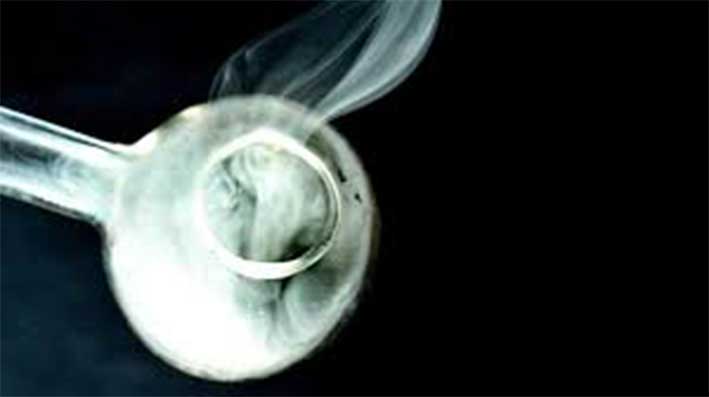What Does Crack Smell Like?

Medically Reviewed By: Kimberly Langdon, M.D.

Written by: Fikret Terzic MD, MS
Crack cocaine has a burning plastic, chemical, or acetone odor. The smell can differ depending on what additives and cutting agents are mixed into the drug, as well as how it’s made. However, the smell of crack is difficult to detect unless it is being heated or smoked.

Crack (often known as freebase cocaine) is a very addictive drug made from the coca plant. What it smells like can vary depending on how it’s made and what it’s cut with.
Crack cocaine is made by mixing baking soda and water with cocaine hydrochloride powder and heating it until it hardens. The “rock” is then heated and the vapor is smoked, but snorting and injecting crack is possible too.
Besides how it’s made and what it’s cut with, how crack is used can also change the smell. It can smell different depending on if it’s snorted, injected, or smoked.
The Smell Of Crack Cocaine
Different forms of cocaine have different odors. While white powder cocaine can have a chemical or floral scent, crack cocaine likely smells like burning plastic, rubber, or cleaning chemicals.
It can also smell like solvents, sulfuric acid, gas, motor oil, paint, or like a nail salon. It really depends on what it’s cut with.
When you’re smoking crack is likely the only time you can smell this odor. The smell can be hard to detect if the drug is not lit or heated.
Crack Cocaine Additives
Crack cocaine is often cut with other substances in order to stretch the supply or increase the potency. What it’s cut with is often impossible to know which is one of the reasons it’s so dangerous.
According to the Centers for Disease Control and Prevention, Ohio was the worst state when it came to cocaine overdose deaths in 2019. Part of the reason for that was due to fentanyl being mixed into cocaine.
Some of the other cutting agents crack might contain include:
- laundry detergent
- laxative
- lactose
- talcum powder
- caffeine
- levamisole (a drug used in veterinary medicine)
- benzocaine or lidocaine
- opioids like heroin
- methamphetamine
The inclusion of these substances can change how the drug smells as well as how your body reacts to it.
Signs Of Crack Cocaine Abuse
While looking for crack odors can be one way to tell if a loved one is struggling with crack cocaine addiction, it’s not the only way. When the stimulant drug isn’t being used, it can have no smell at all, so smelling it may not be the best method.
You can also look out for other signs of crack cocaine abuse, which may include:
- crack cocaine paraphernalia like glass pipes, metal screens, or foils
- burns or blisters on lips or fingers
- chest pain
- asthma attacks
- high energy followed by exhaustion
- hyperactivity
- talkativeness
- tremors or “jitters”
- paranoia
- intense mood swings
- social isolation
- financial issues due to spending money on crack
Crack Cocaine Addiction Treatment
If you or a loved one live with crack cocaine addiction, there is lots of help available. While there is currently no medication available to help with cocaine use disorder, there are plenty of other drug addiction treatment options available.
Typically, you can access addiction treatment programs for crack abuse through an inpatient or outpatient treatment center.
Some of the treatment options include:
Medical Detox
If you’ve used crack cocaine for a while, chances are you’ve built up a dependence on the drug. When you try to stop taking it, uncomfortable withdrawal symptoms are likely to show up.
To make the withdrawal process a little easier, healthcare providers in detox programs can address, support, and ease your symptoms until you’re stable.
Behavioral Therapy
Behavioral therapy forms the foundation of addiction treatment by addressing your mental health and behavioral health, and is offered on both a group and individual basis.
Common therapies that can help with crack addiction include cognitive behavioral therapy (CBT), motivational interviewing, and contingency management. These therapies help you address unhealthy patterns of drug abuse.
For anyone looking for help with substance abuse, Ohio Recovery Center offers treatment options to fit your needs, including detox, inpatient drug rehab, and aftercare services.
To learn more, please call our helpline today.
- The Cincinnati Enquirer — Cincinnati and Ohio at epicenter of spiking fatal ODs from fentanyl-laced cocaine https://www.cincinnati.com/story/news/2019/11/25/fentanyl-places-ohio-first-u-s-fatal-cocaine-overdoses/4295949002/
- Drug Policy Alliance — 10 Facts About Cocaine https://drugpolicy.org/sites/default/files/cocainefacts_august_2018_1.pdf?_ga=2.12280500.1801357004.1624894850-1337364674.1622552775
- https://nida.nih.gov/publications/principles-drug-addiction-treatment-research-based-guide-third-edition/evidence-based-approaches-to-drug-addiction-treatment/behavioral-therapies/cognitive-behavioral-therapy https://nida.nih.gov/publications/principles-drug-addiction-treatment-research-based-guide-third-edition/evidence-based-approaches-to-drug-addiction-treatment/behavioral-therapies/cognitive-behavioral-therapy
- National Institute on Drug Abuse — Commonly Used Drugs Charts https://nida.nih.gov/research-topics/commonly-used-drugs-charts#cocaine
- National Institute on Drug Abuse — Contingency Management Interventions/Motivational Incentives (Alcohol, Stimulants, Opioids, Marijuana, Nicotine) https://nida.nih.gov/publications/principles-drug-addiction-treatment-research-based-guide-third-edition/evidence-based-approaches-to-drug-addiction-treatment/behavioral-therapies/contingency-management-interventions-motivational-incentives

